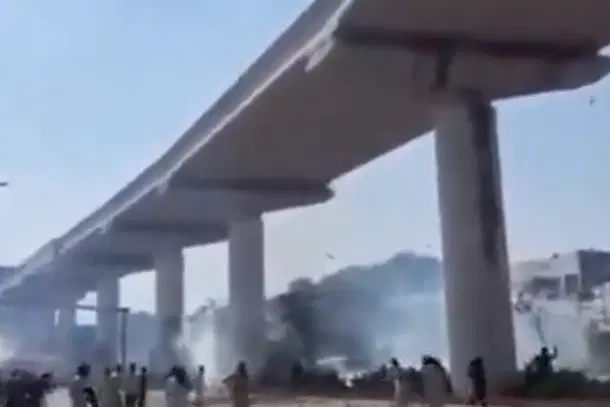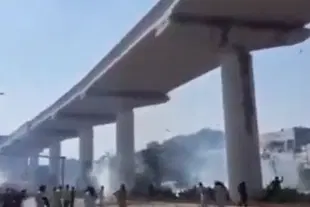News Brief
From Blasphemy Defence To Street Power: The Rise of Radical Islamist Group Tehreek-e-Labbaik In Pakistan’s Politics
Swarajya Staff
Oct 15, 2025, 02:59 PM | Updated 02:59 PM IST
Save & read from anywhere!
Bookmark stories for easy access on any device or the Swarajya app.


Pakistan descended into chaos this week as Tehreek-e-Labbaik Pakistan, a far-right Islamist group, staged violent protests that brought major cities in the neighbouring country to a standstill.
The demonstrations, ostensibly organised in solidarity with Palestinians, resulted in five deaths after police launched a clearance operation against over 7,000 supporters camped at Muridke.
The clashes began on 9 October when the group announced plans to march from Lahore to the US Embassy in Islamabad, prompting authorities to seal roads, suspend mobile internet services, and deploy Pakistan Rangers across Punjab.
Founded on 1 August 2015 by cleric Khadim Hussain Rizvi, Tehreek-e-Labbaik Pakistan has rapidly evolved from a movement defending Pakistan's notorious blasphemy laws into one of the country's most disruptive political forces.
Currently led by Saad Hussain Rizvi, who succeeded his late father, the group calls for the establishment of a Sharia-driven Islamic state.
The party primarily caters to Barelvis, a Sunni revivalist movement representing approximately 50 per cent of Pakistan's population.
The group is notorious for its strategic use of violent protests to influence government decisions.
Over the past decade, TLP has paralysed cities through demonstrations involving thousands of religiously motivated followers willing to confront security forces aggressively.
The party maintains an extreme stance on Pakistan's blasphemy laws, employing violent means including lynchings and mob justice against any attempts at reform.
Their protests have previously resulted in attacks on Christian churches, with members arrested following the 2023 Jaranwala church arsons.
During the recent unrest, Pakistani authorities detained at least 170 people across Punjab, dug trenches to block routes to Islamabad, and imposed Section 144 banning public gatherings.
Educational institutions in Lahore, a city of more than 14 million people, remained shuttered while shipping containers sealed entry points to the capital.
Local Police reported that 48 officers were injured in Friday's clashes, with demonstrators pelting stones, wielding spiked batons, and allegedly opening fire on law enforcement.
The Pakistani government's struggle to contain TLP highlights a deeper challenge.
Despite being briefly banned as a terrorist organisation in 2021, the group secured concessions through street power, revealing the state's vulnerability to hardline Islamist movements.
Analysts warn that TLP's ability to mobilise tens of thousands poses serious challenges to Pakistan's fragile pluralistic norms, with the infrastructure of extremism providing fertile ground for radicalisation that extends even to the Pakistani diaspora abroad.




